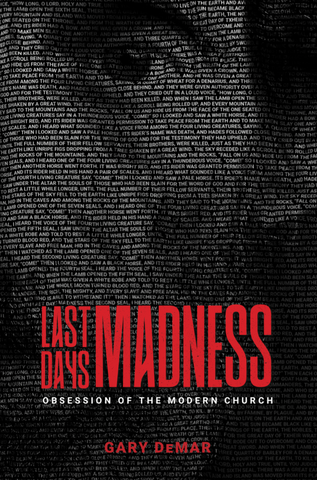Gary interacts with two articles by David Jeremiah and Dr. Michael Brown regarding the climate of the modern Church.
The Apostle John’s antichrist doctrine is a theological concept related to an apostasy that was fomenting in his day. John did not have a particular individual in mind but rather individuals who taught that Jesus Christ is not who the Bible says He is:
In one word, “Antichrist” meant for John just denial of what we should call the doctrine, or let us rather say the fact, of the Incarnation. By whatever process it had been brought about, “Christ” had come to denote for John the Divine Nature of our Lord, and so far to be synonymous with “Son of God.” To deny that Jesus is the Christ was not to him therefore merely to deny that he is the Messiah, but to deny that he is the Son of God; and was equivalent therefore to “denying the Father and the Son”—that is to say, in our modern mode of speech, the doctrine—in fact—of the Trinity, which is the implicate of the Incarnation. To deny that Jesus is Christ come—or is the Christ coming—in flesh, was again just to refuse to recognize in Jesus Incarnate God. Whosoever, says John, takes up this attitude toward Jesus is Antichrist.[1]
Is this interpretation possible? Aren’t we supposed to look for a future apostasy out of which the antichrist will arise? As the New Testament makes clear, apostasy was rampant almost from the church’s inception. The apostasy about which John wrote was operating in his day. Paul had to counter a “different gospel” that was “contrary” to what he had preached (Gal. 1:6–9). He had to battle “false brethren” (2:4, 11–21; 3:1–3; 5:1–12). He warned the Ephesian church leadership that “men will arise, speaking perverse things, to draw away the disciples after them” (Acts 20:28–30). Theological insurrection came from within the Christian community.
Many people prior to Jerusalem’s destruction in A.D. 70 questioned and disputed basic Christian doctrines like the resurrection (2 Tim. 2:18); some even claimed that the resurrection was an impossibility (1 Cor. 15:12). Strange doctrines were taught. Some “Christians” prohibited marriage (1 Tim. 4:1–3). Others denied the validity of God’s good creation (Col. 2:8, 18–23). The apostles found themselves defending the faith against numerous false teachers and “false apostles” (Rom. 16:17–18; 2 Cor. 11:3–4, 12:15; Phil. 3:18–19; 1 Tim. 1:3–7; 2 Tim. 4:2–5). Apostasy increased to such an extent that Paul had to write letters to a young pastor who was experiencing these things firsthand (1 Tim. 1:19–20; 6:20–21; 2 Tim. 2:16–18; 3:1–9, 13; 4:10, 14–16). In addition, entire congregations fell to apostasy:
One of the last letters of the New Testament, the book of Hebrews, was written to an entire Christian community on the very brink of wholesale abandonment of Christianity. The Christian church of the first generation was not only characterized by faith and miracles; it was also characterized by increasing lawlessness, rebellion, and heresy from within the Christian community—just as Jesus foretold in Matthew 24.15
The book of Revelation recounts such heretical teachings: “evil men” (2:2), “those who call themselves apostles” but who are found to be “false” (2:6), a revival of “the teaching of Balaam” (2:14), those “who hold the teaching of the Nicolaitans” (2:15), the toleration of the “woman Jezebel … who leads” God’s “bond-servants astray, so that they commit acts of immorality and eat things sacrificed to idols” (2:20). The apostasy was alive and well on planet earth in the first century (2 Thess. 2:3).

Last Days Madness
In this authoritative book, Gary DeMar clears the haze of "end-times" fever, shedding light on the most difficult and studied prophetic passages in the Bible, including Daniel 7:13-14; 9:24-27; Matt. 16:27-28; 24-25; Thess. 2; 2 Peter 3:3-13, and clearly explaining a host of other controversial topics.
Buy NowGary interacts with two articles by David Jeremiah and Dr. Michael Brown regarding the climate of the modern Church. Both use current events to point to the “fact” of the nearness of the “last days.” As Solomon said, “there is nothing new under the sun,” and that’s especially true in the area of prophetic speculation.
Click here for today’s episode
Click here to browse all episodes of The Gary DeMar Podcast
[1] Benjamin B. Warfield, “Antichrist,” in Selected Shorter Writings of Benjamin B. Warfield, John E. Meeter, ed. (Nutley, NJ: Presbyterian and Reformed, 1970), 1:360–361.

